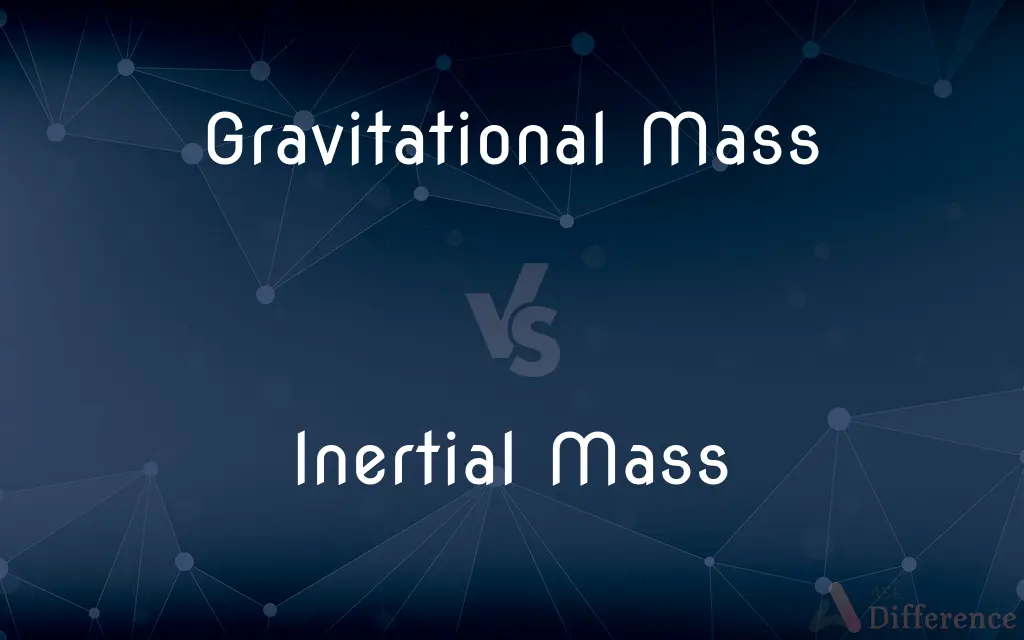Gravitational Mass vs. Inertial Mass — What's the Difference?
By Fiza Rafique & Maham Liaqat — Published on March 4, 2024
Gravitational mass is how much an object is attracted by gravity, while inertial mass measures resistance to acceleration.

Difference Between Gravitational Mass and Inertial Mass
Table of Contents
ADVERTISEMENT
Key Differences
Gravitational mass determines how strongly an object is pulled by gravity. It's the "charge" of gravity, affecting how bodies attract each other. Inertial mass, on the other hand, measures an object's resistance to changes in motion. It's a fundamental property influencing how much an object accelerates under a given force.
The equivalence principle, a cornerstone of general relativity, posits that gravitational and inertial masses are equivalent. This principle is why objects in a gravitational field accelerate at the same rate, regardless of their mass. However, while they are numerically equal, they arise from different phenomena: gravitational mass from the interaction with gravitational fields, and inertial mass from the resistance to acceleration.
In experiments, gravitational and inertial masses are measured through different methods. Gravitational mass is assessed by weighing an object, determining the force of gravity on it. Inertial mass is measured by applying a known force and observing the acceleration, using Newton's second law.
Despite their conceptual differences, no experiment has yet shown a difference between gravitational and inertial mass. This equivalence is a profound aspect of our understanding of the universe, suggesting a deep connection between gravity and inertia that Einstein's theory of general relativity explores further.
Comparison Chart
Definition
Measure of an object's attraction to gravity.
Measure of an object's resistance to acceleration.
ADVERTISEMENT
Principle
Determines how strongly two bodies attract each other.
Determines how much an object accelerates under a given force.
Equivalence
Numerically equal to inertial mass due to the equivalence principle.
Numerically equal to gravitational mass.
Measurement
Assessed by weighing an object.
Measured by applying a known force and observing acceleration.
Role in Physics
Key in the theory of gravity and general relativity.
Fundamental in Newtonian mechanics and dynamics.
Compare with Definitions
Gravitational Mass
Universal Gravitation
Gravitational mass is central to Newton's law of universal gravitation.
Inertial Mass
Newton's Second Law
The concept of inertial mass is key to Newton's second law of motion.
Gravitational Mass
Measured by Weighing
Scientists measure gravitational mass using scales calibrated against standard masses.
Inertial Mass
Measured by Force and Acceleration
Inertial mass is calculated by dividing applied force by the resultant acceleration.
Gravitational Mass
Depends on Mass and Distance
Gravitational mass affects the orbit of satellites around planets.
Inertial Mass
No Dependence on Gravity
Inertial mass remains constant regardless of the gravitational field strength.
Gravitational Mass
Measure of Attraction
The gravitational mass of Earth determines its pull on the Moon.
Inertial Mass
Resistance to Acceleration
A car's inertial mass determines how quickly it can speed up or slow down.
Gravitational Mass
Influences Weight
An object's weight on the Moon is less than its weight on Earth due to different gravitational masses.
Inertial Mass
Fundamental in Dynamics
Inertial mass is crucial in understanding motion under applied forces.
Common Curiosities
How are gravitational and inertial masses measured?
Gravitational mass by weighing, inertial mass by observing acceleration under a known force.
What is gravitational mass?
The measure of an object's attraction to gravity.
How does inertial mass affect motion?
It determines how much an object accelerates when a force is applied.
Why are gravitational and inertial masses equivalent?
Due to the equivalence principle, suggesting a fundamental connection in physics.
What is inertial mass?
The measure of an object's resistance to acceleration.
Do gravitational and inertial masses differ in any physical way?
Conceptually, yes; experimentally, they are indistinguishable.
Is the equivalence of gravitational and inertial mass proven?
It's supported by all experiments to date, fundamental to general relativity.
What would happen if gravitational and inertial masses were different?
It would require a revision of fundamental physics principles, affecting theories like general relativity.
Can inertial mass change with location?
No, inertial mass is independent of location and gravitational field strength.
Why is inertial mass important in physics?
It's essential for understanding the dynamics of motion under forces.
How does the equivalence principle impact physics?
It supports the theory that gravity and acceleration are indistinguishable, foundational for general relativity.
Can gravitational mass be directly measured?
Yes, by weighing an object and comparing it to standard masses.
How does gravitational mass affect an object's weight?
It determines the force of gravity on the object, thus its weight.
What role does gravitational mass play in orbits?
It determines the gravitational pull between orbiting bodies.
How does gravity relate to gravitational mass?
Gravity is the force that acts between objects due to their gravitational masses.
Share Your Discovery

Previous Comparison
White Collar Jobs vs. Blue Collar Jobs
Next Comparison
Petrolatum vs. Petroleum JellyAuthor Spotlight
Written by
Fiza RafiqueFiza Rafique is a skilled content writer at AskDifference.com, where she meticulously refines and enhances written pieces. Drawing from her vast editorial expertise, Fiza ensures clarity, accuracy, and precision in every article. Passionate about language, she continually seeks to elevate the quality of content for readers worldwide.
Co-written by
Maham Liaqat















































